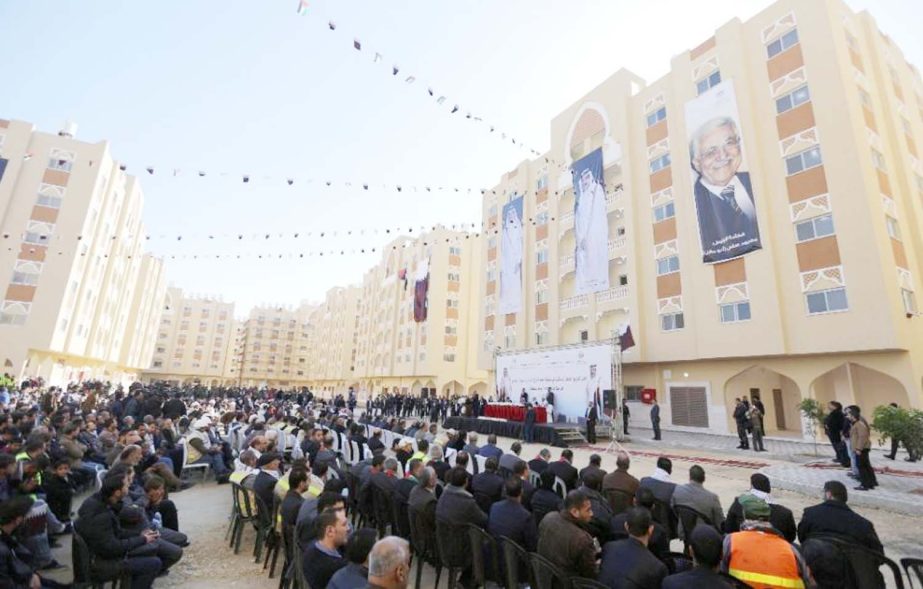
AFP, Khan Yunis :
Qatar on Saturday provided more than 1,000 apartments to residents of the Gaza Strip whose homes were destroyed in the 2014 war between Israel and the Islamist Palestinian movement Hamas.
The 50-day conflict killed 2,200 Palestinians and also left 100,000 homeless, according to the United Nations, and also claimed the lives of 70 Israelis.
“Today, we are inaugurating the first phase of the Hamad residential city (project),” said Qatari envoy Mohammed Al-Emadi told reporters in the southern Gaza city of Khan Yunis.
A total of 1,060 apartments have been completed and the title deeds were being handed out to their new owners, he said at a ceremony at the apartment complex.
Emadi said that more than 1,2000 apartments are being built and would constitute the second phase of the project, with a third phase to follow.
Qatar has allocated a total of $407 million (373 million euros) for the reconstruction of the Gaza Strip, including homes, infrastructure and a hospital.
Emadi said the project was delayed for a year due to “restrictions on the entry of construction material” imposed by Israel since 2006, which maintains a blockade on the Palestinian enclave.
Palestinians and international organisations say the restrictions, aimed at preventing the reconstruction of Hamas’s military infrastructure, cause significant delays in rebuilding Gaza.
NGOs estimate that with the supply of materials and funding at present levels, Gaza home reconstruction could take decades.
The Qatari donations have buoyed Gaza’s de facto Islamist Hamas rulers, irking Israel and the U.S.-backed Palestinian administration based in the occupied West Bank. Past efforts by Qatar to mediate between Hamas and Israel yielded little.
After the 2014 war, Qatar pledged $1 billion for building projects in Gaza, of which $50 million was paid to owners of destroyed houses to fund the rebuilding of shelters. Qatar envoy Mohammed Al-Amadi said 1,000 new homes had been completed since.
“Qatar exerts every effort to help the people of Gaza in the fields of electricity, agriculture, infrastructure and housing, including the rebuilding of completely destroyed houses,” Amadi told Reuters.
Gaza economist Maher Al-Tabbaa said reconstruction efforts were being hampered by difficulties in bringing raw materials to Gaza.
Israel bars the import of products it suspects Hamas might use to rearm or build fortifications, although it began easing restrictions in October under a mechanism overseen by the United Nations.
“Only 400,000 tonnes of cement have entered Gaza since October 2014, or the equivalent of Gaza’s need of cement in two months only,” said Tabbaa, who is also in charge of public relations at Gaza’s Chamber of Commerce.
Officials said on Saturday that Qatari funding had provided another 1,060 new homes in the Gaza town of Khan Younis for low-income families.
An Indonesian-funded hospital opened in Gaza last month, the first new medical centre in the territory in a decade.
Qatar on Saturday provided more than 1,000 apartments to residents of the Gaza Strip whose homes were destroyed in the 2014 war between Israel and the Islamist Palestinian movement Hamas.
The 50-day conflict killed 2,200 Palestinians and also left 100,000 homeless, according to the United Nations, and also claimed the lives of 70 Israelis.
“Today, we are inaugurating the first phase of the Hamad residential city (project),” said Qatari envoy Mohammed Al-Emadi told reporters in the southern Gaza city of Khan Yunis.
A total of 1,060 apartments have been completed and the title deeds were being handed out to their new owners, he said at a ceremony at the apartment complex.
Emadi said that more than 1,2000 apartments are being built and would constitute the second phase of the project, with a third phase to follow.
Qatar has allocated a total of $407 million (373 million euros) for the reconstruction of the Gaza Strip, including homes, infrastructure and a hospital.
Emadi said the project was delayed for a year due to “restrictions on the entry of construction material” imposed by Israel since 2006, which maintains a blockade on the Palestinian enclave.
Palestinians and international organisations say the restrictions, aimed at preventing the reconstruction of Hamas’s military infrastructure, cause significant delays in rebuilding Gaza.
NGOs estimate that with the supply of materials and funding at present levels, Gaza home reconstruction could take decades.
The Qatari donations have buoyed Gaza’s de facto Islamist Hamas rulers, irking Israel and the U.S.-backed Palestinian administration based in the occupied West Bank. Past efforts by Qatar to mediate between Hamas and Israel yielded little.
After the 2014 war, Qatar pledged $1 billion for building projects in Gaza, of which $50 million was paid to owners of destroyed houses to fund the rebuilding of shelters. Qatar envoy Mohammed Al-Amadi said 1,000 new homes had been completed since.
“Qatar exerts every effort to help the people of Gaza in the fields of electricity, agriculture, infrastructure and housing, including the rebuilding of completely destroyed houses,” Amadi told Reuters.
Gaza economist Maher Al-Tabbaa said reconstruction efforts were being hampered by difficulties in bringing raw materials to Gaza.
Israel bars the import of products it suspects Hamas might use to rearm or build fortifications, although it began easing restrictions in October under a mechanism overseen by the United Nations.
“Only 400,000 tonnes of cement have entered Gaza since October 2014, or the equivalent of Gaza’s need of cement in two months only,” said Tabbaa, who is also in charge of public relations at Gaza’s Chamber of Commerce.
Officials said on Saturday that Qatari funding had provided another 1,060 new homes in the Gaza town of Khan Younis for low-income families.
An Indonesian-funded hospital opened in Gaza last month, the first new medical centre in the territory in a decade.

